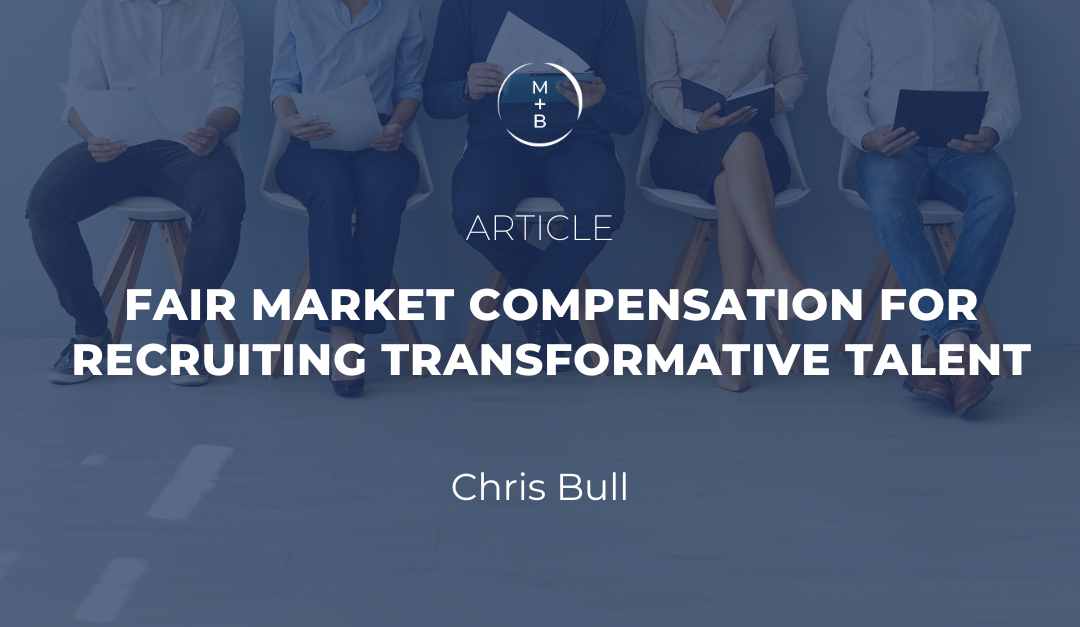Over the last several years, the executive talent market and executive search landscape have transformed, especially in compensation. Since 2019, I’ve seen senior executive cash compensation levels increase on average by 10% – 15%. Many attribute this to the Great Resignation and Great Reshuffle, but from my experience, the pandemic’s influence on this trend was limited.
Why the Pandemic Had Little Impact on a Rise in Compensation

Since the Great Recession of 2008, compensation remained relatively stagnant. Around that same time in the late 2000s, the conversation around the “war for talent” and the impending talent shortage began to take shape. For over 15 years, talent experts and search firms warned companies and hiring managers of the eventual mass exodus of baby boomers from the workforce. The concern revolved around the insufficient availability of skilled individuals from upcoming generations to occupy leadership vacancies when the need arose. The widely discussed “war for talent” remained an abstract concept without a clear timeline, until it suddenly became our reality: a new normal in the talent shortage. It became an all out war and just so happened to surface right in the height of the pandemic. This shift had been long overdue for the executive hiring market, indicating that salary plateaus are here to stay. As businesses, boards, and investors navigate this new reality, here are essential factors to consider when recruiting top talent.
Defining Fair Market Compensation
In today’s talent shortage, sought after senior executives can command a higher compensation within the overall range for the role and competitors will match or exceed it. Yet, even in 2023, some organizations still adhere to outdated hiring philosophies, often underestimating senior executive compensation as if operating in 2017. Finding a great talent deal is challenging; however, determining the right compensation is an even bigger hurdle. Typically, the compensation disconnect usually stems from three common misconceptions:
Salary Benchmarks
Reliance on outdated salary benchmarks suggested by a colleague or friend from 3-5 years ago.
Current Executive Compensation
The belief that current executives’ compensation should dictate the pay for newcomers at similar positions.
Equity
The assumption that offering equity in lieu of a competitive salary is a “competitive” compensation package.
As a result, this subjective understanding of fair market compensation often misaligns with a company’s talent expectations and what candidates anticipate in terms of remuneration. To bridge this gap, I recommend companies remain open-minded, flexible, and receptive, even if they initially experience some pushback.
Internal Benchmarks in Compensation

As I always say, “market is market.” When a client presents a compensation range that is towards the lower end, typically that points to an issue with internal equity. This refers to the current compensation bands that existing executives fall within. Likely these individuals haven’t received significant raises in recent years to match current market standards. When companies use this as their compensation barometer for hiring executive talent in 2023, they need to be incredibly cautious. Offering a compensation package that was competitive five years ago will result in less qualified talent and limit your reach of exceptional talent. Undoubtedly some candidates will accept a lower level of compensation, but the caliber of talent will be less impressive and impactful. Additionally, current executives whose compensation has not kept pace with fair market value can easily be persuaded to move on in their career and accept an offer elsewhere that recognizes their value. Keeping pace with current market salaries and compensation strategies will not only open the door for higher quality talent but help retain your existing leadership.
The Role of Equity in Compensation
Another trap that hiring managers and search committees fall prey to is the compensation workaround of equity. In today’s market, candidates are looking for competitive cash compensation, including base and target bonus, while equity (real or synthetic) is not as novel as it once was 5–10 years ago when PE investments were less prevalent. Today, virtually every organization that can offer equity or a long-term incentive plan (LTIP) does, which drives this incentive to the bottom of the negotiation ladder. Chances are, a candidate already has some form of equity, so offering a salary that’s below market value but provides equity will not get you very far. Today candidates expect fair market value compensation, and this is true across all aspects of the compensation package.
Limitations in Seeking Top Talent

I have partnered with hundreds of companies in finding and hiring transformative talent. A pivotal part of this process is determining an appropriate compensation range. If clients set a budget below market value and remain inflexible, it restricts our talent pool. I often challenge clients at the beginning of the search process to be open to understanding the value of exceptional talent and what they can expect to find within their initial range. For example, when assessing your options between two candidates that differ in salary by $50K (say for example an executive that expects a base salary of $250K, versus one who expects $300K) choosing the candidate at the higher end of the compensation range, who has more experience and can provide more value to the organization is clearly the better choice. In the grand scheme, $50K is negligible in terms of the investment. However, remaining flexible and stretching your compensation range from the mid–50th percentile range into the 75th or 80th percentile is one of the best ways to uncover that exceptional leader for which you are searching.
McDermott + Bull partners with companies looking to hire senior executives and C-Level leaders, and they expect to see top talent. However, my consistent advice is to be prepared to pay fair market compensation. If you are looking to hire transformative talent and you want the ROI that comes along with them, work with a search consultant that not only understands the value of investing in a candidate, but the return on value they can bring to the organization.
About the Author
Chris Bull
Managing Partner + Co-Founder
bull@mbexec.com
Chris Bull serves as a Managing Partner and Co-Founder at McDermott + Bull, based in Irvine, CA. He brings over 20 years of experience in retained executive search and has a strong track record of success partnering with client organizations to deliver best-in-class talent with private and public companies, private equity firms, and their operating companies.


